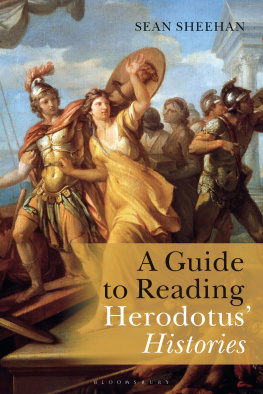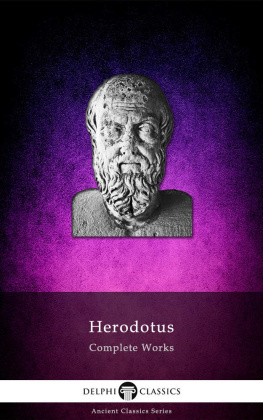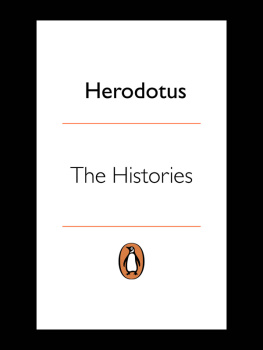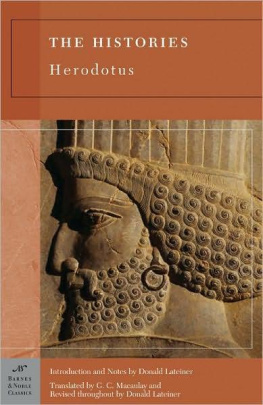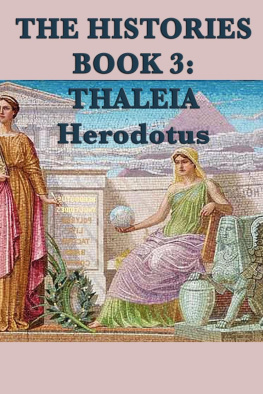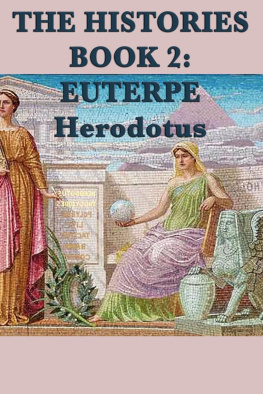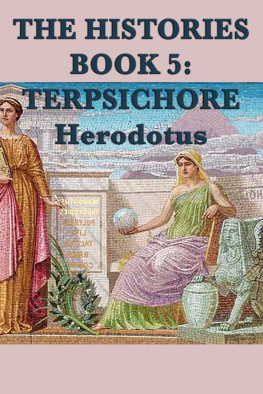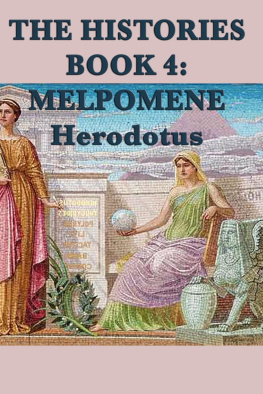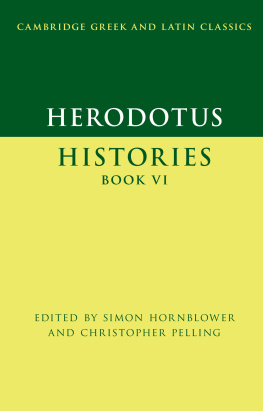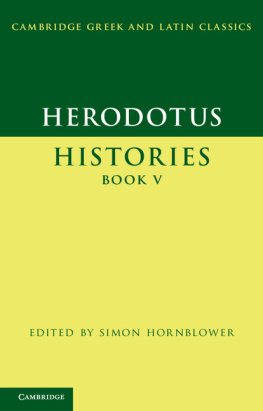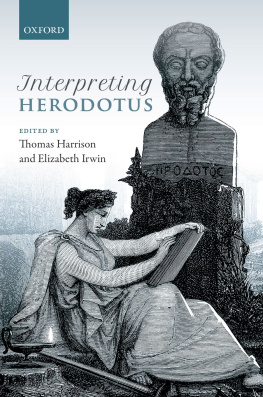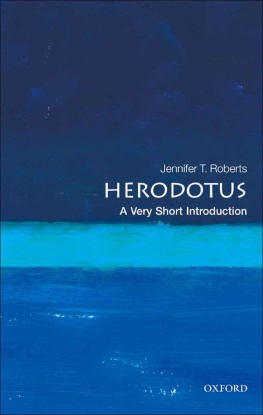Herodotus - A guide to reading Herodotus Histories
Here you can read online Herodotus - A guide to reading Herodotus Histories full text of the book (entire story) in english for free. Download pdf and epub, get meaning, cover and reviews about this ebook. City: London, year: 2018, publisher: Bloomsbury UK, genre: Art. Description of the work, (preface) as well as reviews are available. Best literature library LitArk.com created for fans of good reading and offers a wide selection of genres:
Romance novel
Science fiction
Adventure
Detective
Science
History
Home and family
Prose
Art
Politics
Computer
Non-fiction
Religion
Business
Children
Humor
Choose a favorite category and find really read worthwhile books. Enjoy immersion in the world of imagination, feel the emotions of the characters or learn something new for yourself, make an fascinating discovery.
- Book:A guide to reading Herodotus Histories
- Author:
- Publisher:Bloomsbury UK
- Genre:
- Year:2018
- City:London
- Rating:4 / 5
- Favourites:Add to favourites
- Your mark:
- 80
- 1
- 2
- 3
- 4
- 5
A guide to reading Herodotus Histories: summary, description and annotation
We offer to read an annotation, description, summary or preface (depends on what the author of the book "A guide to reading Herodotus Histories" wrote himself). If you haven't found the necessary information about the book — write in the comments, we will try to find it.
A guide to reading Herodotus Histories — read online for free the complete book (whole text) full work
Below is the text of the book, divided by pages. System saving the place of the last page read, allows you to conveniently read the book "A guide to reading Herodotus Histories" online for free, without having to search again every time where you left off. Put a bookmark, and you can go to the page where you finished reading at any time.
Font size:
Interval:
Bookmark:

Herodotus
Histories
ALSO PUBLISHED BY BLOOMSBURY
Herodotus, John Gould
The Human and the Divine in History, Paul V. Niskanen
The Origin of the History of Israel, Jan-Wim Wesselius
Sophist Kings, Vernon L. Provencal

In Memory: 20082014
Abductions
Lydian kings before Croesus
Croesus as king
Kings of the Medes before Astyages
Birth of Cyrus
Cyrus genealogy
Ionia logos and Persian expansion
Outline
Herodotus reticence about religious matters (2.198)
Egypt: sources and verification (2.198)
Egyptian kings
Proteus: a short story (2.11220)
Outline
Cambyses descent into madness
The Samian logos: part 1
Mixed motives
Outline
Scythia: origins, people, geography (4.558)
Darius expedition to Scythia (4.83144)
History of Cyrene (4.15967)
Digressions
Crossings between Asia and Europe
Before the Ionian revolt (5.138)
Athenian history (5.5596)
Outline
Histiaeus biography
Sparta, Aegina and Athens (6.4993)
The Alcmaeonids
Impieties, epiphanies, curses and divine messages
Outline
The road to Thermopylae
Persian imperialism: successes and setbacks
Decisions, debates and dreams
Reaching and crossing the Hellespont
The Battle of Thermopylae
Outline
The Persian invasion: omens, the uncanny and the divine
Timescales for Xerxes invasion
Outline
Female royals empowered by vengeance
Most quotations from Herodotus in English, and all those in Greek, are based on the four volumes of the Loeb Classical Library edition, translated by Godley. This translation, alongside early twentieth-century commentaries by How and Wells and by Macan, is available online at the Perseus Digital Library (www.perseus.tufts.edu). Godleys translation is also available through Hestia (http://hestia.open.ac.uk). Other translations which are referred to by Slincourt, Waterfield, Blanco, Holland and Mensch are listed in the bibliography under the translators name. Quotations and references to Homer are based on the Lattimore translations and quotations from other ancient Greek writers, unless otherwise stated, are based on those available at the Perseus Digital Library.
All dates referring to the ancient world, unless otherwise stated, are BCE .
It unfolds, to use his image, like a bud.
Egypt has been conquered by the Persians and Psammetichus is forced to watch as his enslaved daughter is compelled to fetch water in a pitcher, accompanied by other girls whose fathers are also compulsory spectators. Psammetichus is the only one who does not cry out and he also remains silent as his son, roped and bridled like an animal, passes by on his way to execution. It is only when he sees one of his servants, now reduced to begging for a living, that he is stricken with grief and bursts into tears. Benjamin suggests possible reasons perhaps the servant is the catalyst for the release of his pent-up grief but observes how Herodotus offers no explanations. Commenting on the absence of psychologizing or emotive reporting, he acclaims how it shows what true storytelling is and compares the story to seeds of grain that after centuries in chambers of the pyramids retain their power of germination.
The Histories has been around for 2,500 years without losing its ability to enliven audiences and, central to its continuing appeal, its storytelling. Penguins first edition of the Histories appeared in the Fiction series, published in a dark period of the Second World War when readers had enough non-fiction to contend with and when imagining the author as a patriotic teller of tall tales, a racy raconteur, might have been welcoming. Here was a conversationalist who enjoyed embellishing his accounts while professing disbelief in what he is about to share with his audience, as in a tale of a precocious child who will become king Cambyses of Egypt, pledging revenge on behalf of his mother aggrieved by a slight from another woman. Having enjoyed the telling of the tale, Herodotus informs us that he finds it unconvincing (3.3). He presents empirical information but with imagination and flair and a modern parody of how he sometimes drew unfounded conclusions brings out what is also beguiling about his writing: England being a very cold country, the Londoners live on a food they call curry, eating it all day long, for it makes their entire bodies feel warm, and when they begin to feel cold again, they eat some more. This food they get from India and it is carried from there on the backs of the dogs one sees all over Britain. This, it seems to me, must be the reason for the great affection the Britons bestow on dogs (Roberts 2011: 59).
Precious little is known for certain about Herodotus life and while there is no agreement about the extent or duration of his travels He is ready to be lured into narrative outings by tales of the uncanny and the fabulous, places and people on the rim, rerouting on the hoof if an interesting excursion suggests itself and creating his own signposts as he maps previously unknown or obscure connections.
Herodotus as a traveller collects stories, learning about the inseparability of the present from the past, and his journeying, listening and storytelling become equally inseparable. A term that brings together a set of such traditionally unrelated temporalities and spatialities is hodology. The study of pathways in geography, hodology can also refer to connections in parts of the brain a coming together of the physical and the cerebral that can be seen taking place as a result of social interactions and the exchange of stories arising in the course of following a path or a trail. We make sense of the world as we move through it, and we follow a story like a trail. In both cases there is an ordering of material, the physical steps of the traveller on the ground mirrored in cognitive movements arising from social exchange during a journey. A call for a new class of mapping that would build on this performative aspect to knowledge unites components that can be seen at work in Herodotus: Knowing is a form of travelling, of moving through space; and travelling, like knowledge, is also a form of narrative (Turnbull 2007: 143). Dewald (1987: 149) writes of Herodotus logon hodos (route of the logoi) that the reader is guided along as the stories calmly proliferate.
The status of Solon as a great sage is bound up with his reputation as a traveller, his wisdom associated with his wandering after his self-exile from Athens, his love of knowledge ( philosophen ) motivating him to travel widely for the sake of seeing the world (1.2930). The word for his sightseeing, theria , means a looking at, viewing before it became a word for a thinking about, linking intellectual movement with physical movement.
If the Histories were a website it would be littered with hyperlinks as Herodotus meanders, branches off and loops back on himself as connections are made across time and space. His journeys, real and textual, become a form of web drifting as one link leads to another with the reader sometimes wondering what the starting point was and while the interruptions are productive the process does not lend itself to static placements on the type of map that was shown to the Spartans. Aristagoras, hoping to persuade the Spartans into supporting a revolt in Ionia, displays a map of the Persian world and points to it as he talks about the great riches that are waiting to be seized by its conqueror (5.49). When the Spartans find out what the map cannot show them, a journey time of three months to reach the Persian capital, they reject the proposition. Herodotus is also interested in adding the dimension of time to the plotting of places on a cartographic representation, not like the Spartans in wanting to know the temporal duration of a journey but because he is aware of how time changes places, concluding his proem with the knowledge that big cities become small and vice versa (1.5). The spring-like structure of his narrative expands and contracts the journeys contained within it according to the ways in which time has affected the subject matter. The failure of Aristagoras map to impress the Spartans is due to an excessively schematic representation of space, something Herodotus found laughable about cartographical displays of the world: drawing the world as round as if fashioned by compasses and depicting Europe and Asia as of equal size (4.36). The challenge for Herodotus in his showing-forth of world history is to avoid an overemphasis on overly abstract representations of space by accommodating non-cartographic aspects like the temporal and the cultural.
Next pageFont size:
Interval:
Bookmark:
Similar books «A guide to reading Herodotus Histories»
Look at similar books to A guide to reading Herodotus Histories. We have selected literature similar in name and meaning in the hope of providing readers with more options to find new, interesting, not yet read works.
Discussion, reviews of the book A guide to reading Herodotus Histories and just readers' own opinions. Leave your comments, write what you think about the work, its meaning or the main characters. Specify what exactly you liked and what you didn't like, and why you think so.

